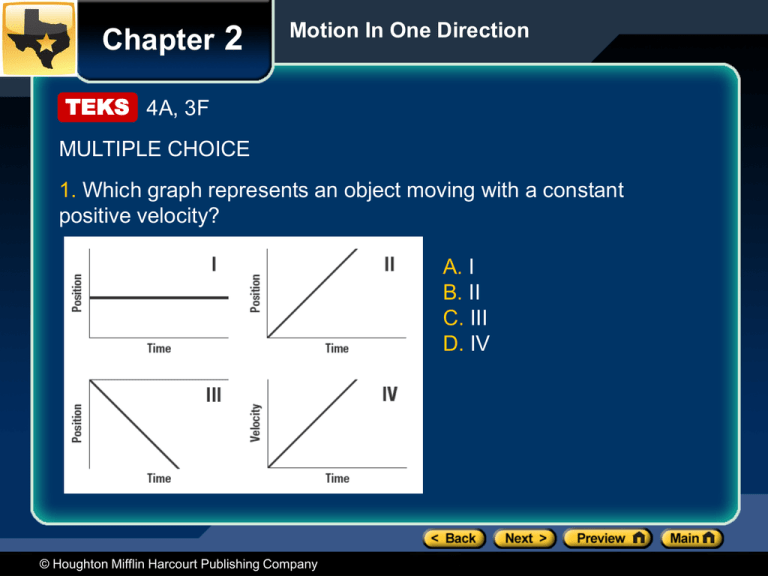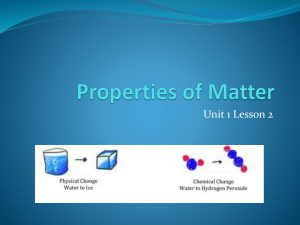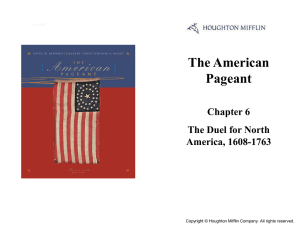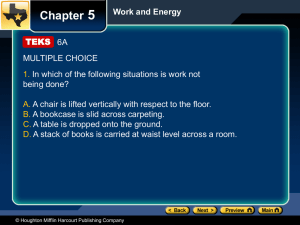TEKS - Sharyland ISD
advertisement

Chapter 2 Motion In One Direction TEKS 4A, 3F MULTIPLE CHOICE 1. Which graph represents an object moving with a constant positive velocity? A. I B. II C. III D. IV © Houghton Mifflin Harcourt Publishing Company Chapter 2 Motion In One Direction TEKS 4A, 3F MULTIPLE CHOICE 1. Which graph represents an object moving with a constant positive velocity? A. I B. II C. III D. IV © Houghton Mifflin Harcourt Publishing Company Chapter 2 Motion In One Direction TEKS 4A, 3F 2. Which graph represents an object at rest? A. I B. II C. III D. IV © Houghton Mifflin Harcourt Publishing Company Chapter 2 Motion In One Direction TEKS 4A, 3F 2. Which graph represents an object at rest? A. I B. II C. III D. IV © Houghton Mifflin Harcourt Publishing Company Chapter 2 Motion In One Direction TEKS 4A, 3F 3. Which graph represents an object moving with constant positive acceleration? A. I B. II C. III D. IV © Houghton Mifflin Harcourt Publishing Company Chapter 2 Motion In One Direction TEKS 4A, 3F 3. Which graph represents an object moving with constant positive acceleration? A. I B. II C. III D. IV © Houghton Mifflin Harcourt Publishing Company Chapter 2 Motion In One Direction TEKS 4B 4. A bus travels from El Paso, Texas, to Chihuahua, Mexico, in 5.2 h with an average velocity of 73 km/h to the south. What is the bus’s displacement? A. 73 km to the south B. 370 km to the south C. 380 km to the south D. 14 km/h to the south © Houghton Mifflin Harcourt Publishing Company Chapter 2 Motion In One Direction TEKS 4B 4. A bus travels from El Paso, Texas, to Chihuahua, Mexico, in 5.2 h with an average velocity of 73 km/h to the south. What is the bus’s displacement? A. 73 km to the south B. 370 km to the south C. 380 km to the south D. 14 km/h to the south © Houghton Mifflin Harcourt Publishing Company Chapter 2 Motion In One Direction TEKS 4B 5. A ball initially at rest rolls down a hill and has an acceleration of 3.3 m/s2. If it accelerates for 7.5 s, how far will it move during this time? A. 12 m B. 93 m C. 120 m D. 190 m © Houghton Mifflin Harcourt Publishing Company Chapter 2 Motion In One Direction TEKS 4B 5. A ball initially at rest rolls down a hill and has an acceleration of 3.3 m/s2. If it accelerates for 7.5 s, how far will it move during this time? A. 12 m B. 93 m C. 120 m D. 190 m © Houghton Mifflin Harcourt Publishing Company Chapter 2 Motion In One Direction TEKS 4B 6. Which of the following is true for a ball thrown vertically upward? The ball has — A. a negative acceleration on the way up and a positive acceleration on the way down. B. a positive acceleration on the way up and a negative acceleration on the way down. C. zero acceleration on the way up and a positive acceleration on the way down. D. a constant acceleration throughout its flight. © Houghton Mifflin Harcourt Publishing Company Chapter 2 Motion In One Direction TEKS 4B 6. Which of the following is true for a ball thrown vertically upward? The ball has — A. a negative acceleration on the way up and a positive acceleration on the way down. B. a positive acceleration on the way up and a negative acceleration on the way down. C. zero acceleration on the way up and a positive acceleration on the way down. D. a constant acceleration throughout its flight. © Houghton Mifflin Harcourt Publishing Company Chapter 2 Motion In One Direction TEKS 4A 7. The graph below shows the position of a runner at different times during a run. Use the graph to determine the runner’s displacement and average velocity for t = 20.0 min to t = 30.0 min A. B. C. D. © Houghton Mifflin Harcourt Publishing Company Δx = +2400 m; v = +4.0 m/s Δx = +1500 m; v = +2.5 m/s Δx = +900 m; v = +2 m/s Δx = +4800 m; v = +2.7 m/s Chapter 2 Motion In One Direction TEKS 4A 7. The graph below shows the position of a runner at different times during a run. Use the graph to determine the runner’s displacement and average velocity for t = 20.0 min to t = 30.0 min A. B. C. D. © Houghton Mifflin Harcourt Publishing Company Δx = +2400 m; v = +4.0 m/s Δx = +1500 m; v = +2.5 m/s Δx = +900 m; v = +2 m/s Δx = +4800 m; v = +2.7 m/s Chapter 2 Motion In One Direction TEKS 4B GRIDDED RESPONSE 8. A car moving due east increases its speed uniformly from 16 m/s to 32 m/s in 10.0 s. How far, in meters, did the car travel while accelerating? © Houghton Mifflin Harcourt Publishing Company Chapter 2 Motion In One Direction TEKS 4B GRIDDED RESPONSE 8. A car moving due east increases its speed uniformly from 16 m/s to 32 m/s in 10.0 s. How far, in meters, did the car travel while accelerating? = +240 © Houghton Mifflin Harcourt Publishing Company







